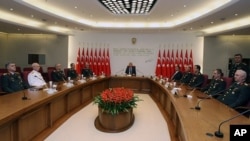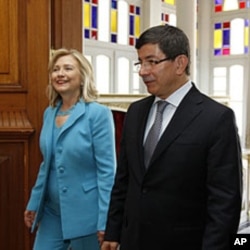Turkey's government and military leaders are meeting for days of talks focusing on promotions of senior military staff. But this year's annual meeting of the country's Supreme Military Council is very different, for it is now the government that is calling the shots. The mass resignation of Turkey's top four military commanders on Friday is widely seen as bringing an end to decades of political meddling by the country's generals. But concerns remain over what the prime minister will do with his newly acquired power.
Powerful army
With the Turkish army forcing four governments from power since 1960, every democratically elected prime minister has had to work in the long shadow of the country's generals, none more so than the present prime minister, Recep Tayyip Erdogan. His Islamic-rooted party is viewed with deep suspicion by Turkey's secularist army. But on Friday, the country's entire military command stepped down in protest at the jailing of scores of fellow senior officers as part of an alleged conspiracy against the government. Deputy editor Yasmin Congar of the Turkish daily Taraf says that action signalled an end to the army's meddling in the country's politics.
"It is one major step in Turkey's very long path of democratization, and in Turkey, the military might has always been stronger than the elected official power," she said. "Now we see that what civilian government wants to do in Turkey can only be checked at the ballot box, not the generals anymore."
The Taraf newspaper has been in the forefront of exposing the alleged army conspiracy against the government. The generals claim the investigation is a witch hunt against them, based on flimsy, unsubstantiated evidence. Bringing the army under civilian control is a key demand of the European Union, which Turkey is seeking to join. But on the streets of Istanbul, there are still mixed feelings about whether the army resignations are a step forward for democracy.
Mixed feelings
"I am positive about it," said one person. "The officers are working under the command of [the] prime minister, if they don't agree [on] something, as a regular people like us, if we don't agree with principles of an organization, we just resign. It is what happens in democracies, and I am very grateful about such normalization."
"It's like a clash between two rivals," said a man, who is not convinced. "It's like 'if you do that, we can also do that, you think that we can't, but we can' - it's that kind of situation. So democracy will remain like what it was before."
Erdogan - increasingly authoritarian
Such reservations can in part be explained by what some observers say is the increasingly authoritarian behavior of the prime minister. Buoyed by repeated electoral success - most recently last month where he secured 50 percent of the vote - critics say he has used his power to intimidate the media and bring the judiciary under greater government control. Political scientist Cengiz Aktar of Istanbul Bahcesehir University, while welcoming the move to bring the army under civilian control, worries about the increasingly unchecked power of the prime minister.
"This overconfidence, this feeling of strength, gives Prime Minister Erdogan all the rights about everything and everybody, going the way of power politics," he said. "This way of approaching [these] issues won't help to bring about any [lasting] solutions."
Clinton concerned
Critics point to the ongoing crackdown on student dissent, the detention of thousands of members of the pro-Kurdish movement, and the jailing of more than 50 journalists as examples of such power politics. Such concerns are being increasingly raised by Turkey's allies, both in Europe and in the United States. In a visit last month to Turkey, U.S. Secretary of State Hillary Clinton raised such concerns.
"Turkey's upcoming constitutional reform process presents an opportunity to address concerns about recent restrictions, which I heard about from young Turks, about freedom of expression and religion, to bolster the protection for minority rights," said Clinton.
Erdogan's promise
But the prime minister in a recent television address reaffirmed his commitment to introducing a new democratic constitution.
Erdogan said the new constitution should be drafted with the largest participation possible, and should be a consensus that will meet the demands of the whole society. He added that it should be democratic and liberal without shortcomings. Observers say honoring that commitment is a key test as to how the prime minister will use his increased power.





